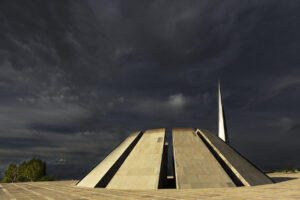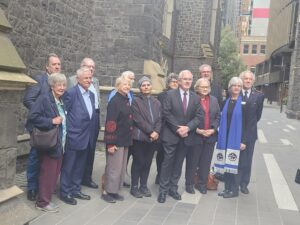
By Scott Kirkland
18 November 2022
A few weeks ago I had the chance to reflect on the parable of the unjust judge with some students who were leaving Trinity College after completing their course of studies. It is a strange parable in which God is presented as a judge who ought to be struck off the bench, with a faithful widow appealing to him for justice. As Luke presents this to us, this is about the need to continue to pray without losing heart (Luke 18:1-8). I thought I would extend those reflections here to think a bit about the practice of theological ethics in the present.
This past month we have been struck yet again with a crisis, another wave of flooding. Of course, I say “yet again” because it seems that the moments in which we are not facing a crisis are now the exceptional ones. Here we are, yet again, cleaning up, rolling out emergency services, fundraising, “responding”. Be it bushfire, flood, extinctions, pandemic, nuclear war, indigenous incarceration, inflation, inequality, the crisis has become the norm. Anyone who has been in my classes will know that this is a rather familiar refrain from me.
Read more: God freed me, may it be so for you also
It’s not for nothing that my colleague Professor Dorothy Lee has lovingly dubbed me the faculty Eeyore. At the start of my introduction to theology unit we begin with the cry of Rachel for her children. This cry is cited by Jeremiah (31:15), where the prophet writes,
Rachel is weeping for her children;
she refuses to be comforted for her children,
because they are no more.
Rachel refuses consolation, for her children are no more. To refuse consolation in the face of great loss is an act of resistance. It is an act of resistance because it is a refusal to accept injustice, it is a refusal to accept that “it is what it is” as we so often say, it is a refusal to be consoled by anything other than resurrection. Refusal is hope.
I try to introduce theology and ethics through Rachel and through this refusal of consolation to help students see that there is no way of disentangling a relentless petition for justice and an absolute solidarity with the downtrodden from a resistance to any false god placed before us. What is the creed we say together other than the refusal to say anything less than that God is a criminal who died on a cross at the hands of an unjust imposter of a ruler, and we stand here as witness to his vindication, the judgement of his Father, resurrection.
The parable of the unjust judge presents us with, strangely, God as antihero, an unjust judge, and a widow. This widow, like Rachel, refuses to accept unjust judgement. She petitions the judge again and again, asking for vindication from her enemy. The judge gets fed up with dealing with her and offers justice.
Jesus concludes this parable by asking, “and yet when the Son of Man comes, will he find faith on earth?”. What are we to learn here? This world is unjust, time is out of joint. As mentioned above, we face a cascade of crises over which we feel utterly impotent. As soon as one leaves, giving us a chance to respond, another arises to trap us in its present, in its urgency. Like the widow, our enemy seems to prevail without judgement being rendered. The forces of darkness – the powers and principalities – throwing people into poverty, destroying our planet, going to war for vainglory and twisted histories, it so often feels as though they are winning.
Read more: I want to talk to my colleagues about Christianity, where do I start?
“And yet when the Son of Man comes, will he find faith on earth?”. When the Son of Man comes, he will vindicate the widow. He will vindicate the one who has refused to acquiesce, who has refused false consolation, who has refused to not mourn the loss of children, who has refused to stop praying. Prayer is an act whereby we appeal in the crucified and resurrected Son of God the Father, who is judge of the world, for justice. It is to do theology. It is to name the false gods for who they are, to confess the true God, and so in faith to live under the sign of the crucified, for the days are coming.
The exhortation I offered those students a few weeks ago, and which I offer you now, is to go forth and do theology like the widow, like Rachel. Refuse the false gods on offer, refuse false hopes, refuse to settle for anything less than resurrection. Pray relentlessly. This will require you to think, it will require you to act, it will require discernment, it will require everything you have to not give in to those false gods and to continue to stand alongside the widow, the poor, the outcasts. The gospel asks for nothing less. For all that is comes from God, and it is only ours as we give it away. I will leave you with a favourite quote from Simone Weil, an early twentieth century French theologian, philosopher and mystic:
Creation is an act of love and it is perpetual. At each moment our existence is God’s love for us. But God can only love himself. His love for us is love for himself through us. Thus, he who gives us our being loves in us the acceptance of not being.
Our existence is made up only of his waiting for our acceptance not to exist. He is perpetually begging from us that existence which he gives. He gives it to us in order to beg it from us.
Dr Scott A Kirkland is Stockdale Senior Lecturer in Ethics at Trinity College Theological School, Melbourne.
For more faith news, follow The Melbourne Anglican on Facebook, Twitter, or subscribe to our weekly emails.







